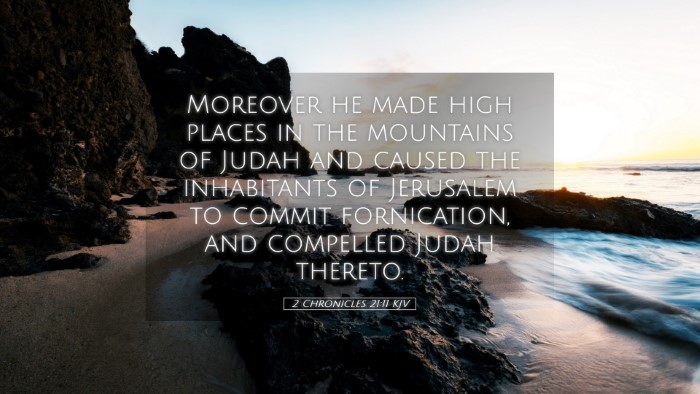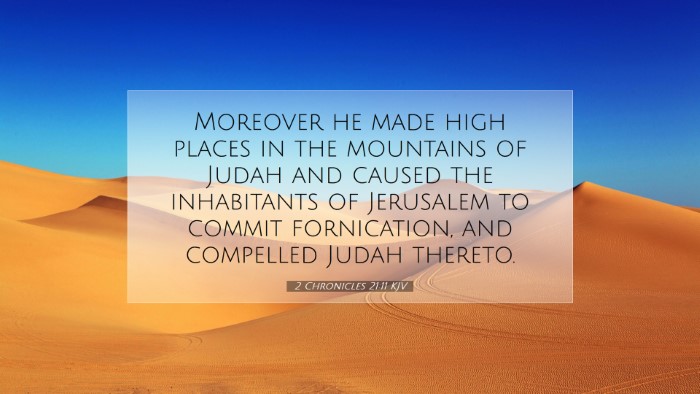2 Chronicles 21:11 - Commentary Summary
The verse in question, 2 Chronicles 21:11, reads:
"Moreover, he made high places in the mountains of Judah, and caused the inhabitants of Jerusalem to commit fornication, and compelled Judah thereto."
Contextual Background
This verse is situated in the historical narrative of the king of Judah, Jehoram. His reign is marked by a significant departure from the commandments of God, leading to spiritual corruption and national calamity.
Commentary Insights
Matthew Henry's Commentary
Matthew Henry highlights the grave implications of Jehoram's actions. He notes that Jehoram not only introduced idolatrous practices but also made a blatant effort to influence the people towards these sins. This apostasy involved setting up high places where the people could worship foreign deities, which was a direct violation of God's commands against such forms of worship.
Henry emphasizes the leader's responsibility in leading the people toward righteousness or in causing them to stumble. Jehoram's influence and actions serve as a cautionary tale about the profound effect that a ruler's choices have on the spiritual state of a nation.
Albert Barnes' Notes
Barnes expands on the significance of the high places mentioned in the verse. He explains that these were often associated with practices that included sexual immorality, which was common in the worship of pagan gods. This intertwining of worship and immorality signifies a deep-rooted corruption among the people of Judah.
He also discusses the verb "compelled," indicating that Jehoram exercised a coercive force over the inhabitants, pushing them towards idolatry and away from the worship of the true God. This reflects a troubling dynamic where the king manipulates religious practices to establish his authority and suppress true worship.
Adam Clarke's Commentary
Clarke's analysis includes a focus on the cultural and historical relevance of the high places. He remarks that they symbolize a compromise of faith, blending the true worship of Yahweh with the surrounding pagan influences. This syncretism represents a societal shift that can often occur when leadership fails to uphold the covenant commitments with God.
Moreover, Clarke notes that the phrase "caused the inhabitants of Jerusalem to commit fornication" indicates spiritual unfaithfulness, likening the worship of idols to spiritual adultery against God. This highlights the seriousness of the sin and its ramifications not just socially, but also spiritually, as the people forsake their covenant relationship with Yahweh.
Theological Implications
In examining verse 11, several theological themes emerge:
- The Nature of Leadership: The actions of a leader significantly influence the moral and spiritual direction of a nation. Jehoram's reign illustrates the dire consequences of failing to follow God's statutes.
- Consequences of Idolatry: The verse serves as a warning about the dangers of idolatry in various forms. The high places symbolize not only physical locations but also indicate the heart's inclination away from God.
- Spiritual Adultery: The metaphor of fornication in this context underscores the severity of turning away from God, portraying such actions as betrayal against God, akin to marital unfaithfulness.
Practical Applications
For pastors, theologians, and scholars, this verse and its commentary invite reflection on several practical points:
- Examine Leadership: Consider how leadership—both spiritual and secular—shapes the faith and practices of a community. Evaluate personal and communal commitments to God’s commands.
- Against Compromise: Challenge the tendency towards syncretism in faith practices. Assess how external influences may be incorporated into worship and ensure fidelity to biblical standards.
- Understanding Spiritual Infidelity: Engage congregations in discussions about what it means to be wholly devoted to God, identifying areas of life where they may be tempted to “worship” other gods—be it materialism, power, or personal ambition.
Conclusion
2 Chronicles 21:11 highlights a pivotal moment in Judah’s history—one that serves as a timeless reminder of the impact of leadership on communal faithfulness. Through the combined insights of Matthew Henry, Albert Barnes, and Adam Clarke, we see the profound implications of Jehoram's reign and its relevance to contemporary faith communities. The charge remains for present-day leaders and congregants alike to seek a genuine and faithful relationship with God, resisting the pressures that lead toward spiritual compromise.


